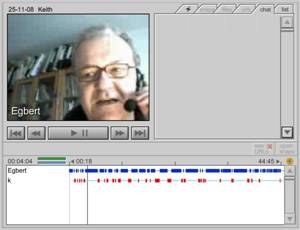CLIL teacher trainer Egbert Weisheit talks to onestopclil about the challenges and benefits of teaching science in English, the state of CLIL in Germany and the lack of co-operation between science teachers and language teachers.
 |
Tell us a little about yourself, who you are and what you do.
I’m a teacher of biology and chemistry and have been teaching in schools for 33 years now. For 20 years I’ve been working as a teacher trainer in a special institution for training people (over two years) in both their subjects. German teachers have to know two subjects. I’m working as a science teacher and as I’m not a trained English language teacher, my English in lessons is based on reading and writing with the students. Sometimes we talk in English but German students are not used to talking about science topics in English lessons; mostly their English lessons are based on humanities, social science, political science and sometimes geography. But in the last ten years we have increasing activity in schools to develop a profile in order to better compete with other schools in the region and so there has been an increase in the teaching of subjects in English.
How old are your students and which classes do they have in English?
I’ve tried using English in science lessons from Grade 7 up so they are 13-14.
What about CLIL in other schools in Kassel, and the region? Is there much CLIL there?
There are 7 schools of the gymnasium type, meaning the grammar school type and in all of these schools there are some activities of science teachers or of language teachers to increase using science materials in either English lessons, or using language material in science lessons. This is because schools are trying to compete in the region and to have a special profile. Industry in Kassel also plays a role since they are interested in trying to increase language activities in science schools, for the very reason that they need young people with languages to come to work for them.
Can you tell us something about the CLIL training that you do for teachers?
My seminar (in the teacher training institute I work for) started a course on bilingual teaching that is joined by English language teachers and subject teachers. These are teachers who perhaps have greater experience from abroad, who could be accepted by their headmasters to be qualified English language teachers even if they are not certified by a university. In this course of bilingual teaching, they deal with didactical problems of English language teaching integrated with another subject. These tend to be humanities, geography, politics and history. Another initiative is a course for beginners on the European dimension of education, to bring people who are interested in using the cultural aspects of their topic to give them material and help on how to teach their subject. The subject could be history or sports, or maths, biology, arts… to integrate the English language in their normal lessons.
There are other small initiatives at the moment: Frankfurt University has just started a course to qualify young teachers and student teachers who are interested in teaching their topic in English even if they are not certified as an English language teacher. But they are rather small initiatives, mostly German schools are looking for an academically-qualified teacher and only in a few cases do they accept teachers who speak English well and are not certified as an English teacher.
What’s your impression of this kind of education in Kassel and Germany in the future: do you think it’s here to stay; do you think it’s going to grow; do you think more schools will have this kind of teaching in Germany?
Most of the schools I visit in the region as a teacher trainer are asking for the possibility of getting one teacher who is trained and qualified to teach science in a foreign language, in English. This number of schools interested in having a bilingual teacher in a science subject or in maths will increase in the years to come because society in Germany is accepting that there are very important links to countries abroad and young people need to be well-educated. I think there is no highly qualified job in Germany you can work in that is not based on English material or on talking in English to people from abroad. So communication skills for students in Germany need to develop. One of the problems that I see as a science teacher is that in many traditional schools English language training is based on texts and not on communication. Science could be a good way to communicate about the topic and to work with skills of communication.
You mean that science could be the medium for teaching children communication skills because it’s not happening in their English lessons?
Yes, there is a broad gap between science teachers and language teachers in German schools. They tend not to communicate with each other at all about their work with children and their curriculum objectives. One of the problems is to bridge this gap between the understanding of language from the language teachers and from the science teachers. English language teachers are normally taught with a second subject from the humanities and it’s mostly a rather academic language they teach. They are don't focus on communication skills, because they are trained in working with paper texts. And as they don’t have experience with audio teaching or with video teaching as we do here, they focus on paper where they can mark faults and where they can give some applause to good ideas on how to talk about a political or social subject. As they are not trained in science, we have this gap in school activities as well. In Germany we have a saying that ‘a good language learner is not a good science learner’. Based on this basic misunderstanding there are two groups: the science learner group and the language learning group. The University of Kassel some years ago tried to bridge this gap and talked to the science professors at the university but they didn’t get a good response. The initiative to bring English language and science training together at university as a project failed and we just have local initiatives at school from individual teachers.
Tell us a little about your work with Science Across the World.
I started Science Across the World with an activity on facts and letters 20 years ago and now I’m trying to carry out an exchange with Indonesia on modern genetics. We'll try first to have a written exchange, and then try with SKYPE or Flashmeeting with Indonesia on this topic. The cultural impact is I think nearly as great as the language impact. We bring students to work in a project which is supported by material and allow them to look for contacts around the world with students in their own language or in English, or another language, and then work with authentic material on the topic that is regularly taught in school. In my case this year, it’s genetics.
Thanks Egbert.
Topics
Your perspectives

Read about CLIL teachers' experiences around the world! Some of the letters provide an overview of the situation for CLIL teachers in individual countries, and some give a more detailed look at teaching.
- 1
- 2
- 3
- 4
- 5
- 6
- 7
- 8
- 9
- 10
- 11
- 12
- 13
- 14
- Currently reading
CLIL in Germany: Interview with Egbert Weisheit
- 16
- 17
- 18
- 19
- 20
- 21
- 22
- 23



No comments yet